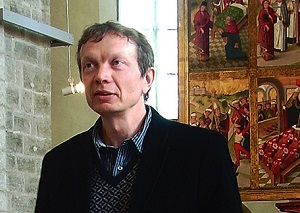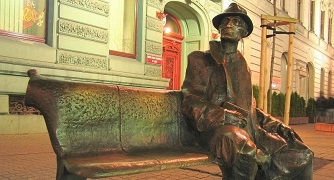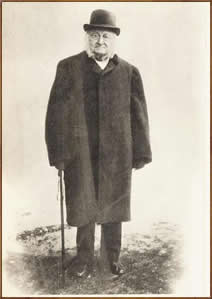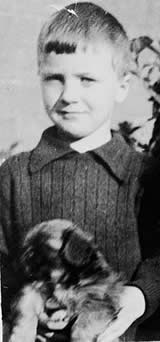|
De Estische
dichter, schrijver en vertaler Tõnu Õnnepalu werd
geboren op 13 september 1962 in Tallin. Zie ook mijn blog van 13 september 2010 en eveneens alle tags voor Tõnu Õnnepalu op dit blog.
My soul is ready
for the journey
My soul is ready for the journey,
coat drawn close and girdled as was the command.
For the carriage will not wait or stay long
in this station
before the long and difficult ascent
that may finally lead to the fearsome mountain,
onto the strange empty ridge where the Nameless is waiting,
or perhaps to another valley, different from this one.
My soul is ready for the journey
but it does not know the way
for it leads through souls own bare territory
and the day journeys are hidden behind the shadows of night.
My soul is ready for the journey
but yet it is afraid to go.
Could it not rest for a while
under the pavilion of your soul?
Does it not belong to the Possible
that it were allowed a moment of oblivion there?
Or is it really your soul that has asked for permission
to sit at the hearth whose fire does not warm me?
And is it not that when one finds rest for a while
and can loosen the girdle,
the other must keep guard and cannot have a share
of the shade and refreshment that it unknowingly offers?
My soul is ready for the journey
but where it is, it is alone,
and still it is night, the Moon lures, but does not show
under what tents cloth the shadows seem to move
and whose shadows they are.
Are they the others, the foreign travellers?
And if morning is still far away.
Is this reddish glow
from the campfire of the Nameless
or is the decampment day already hoisting the flag of light
and the pavilion taken down
before I can even see you face to face?
And where I am lying sleeplessly
it is only an image of your body,
for your soul is travelling too and must not stop.
No, my soul is ready for the journey
and already the changing Moon
burns up in the rising glow of the Day.
And you are nowhere but far,
no, you are nowhere but far
and I am far from you.
And far from me travels my soul.

Tõnu
Õnnepalu (Tallin, 13 september 1962)
De Poolse schrijver Janusz Glowacki werd geboren op 13
september 1938 in Poznań. Zie ook mijn blog van 13 september 2010 en eveneens alle tags voor Janusz Glowacki op dit
blog.
Uit: The Last Supper (Vertaald door Zuza Glowacka)
It was seven p.m.,
towards the end of July, and I was sitting in the restaurant 'Fiorellos' across
from Lincoln Center, wondering how to improve my luck. I was sitting at one of
twelve tables set up on the sidewalk, covered by twelve white and blue striped
umbrellas, created by the famous French designer, Jean Marie Cottarde.
Hurricane Alan was loitering nearby and the air was
thick from
the heat. After my first double scotch, I contemplated moving inside, but after
the third one I dismissed the idea. At around eight, the glass walls of the
Metropolitan Opera darkened, and the flying creatures on Marc Chagall's
frescoes stopped shining through them. Meanwhile the crowd on Broadway
thickened. Glittering couples, wrapped in diamonds and pearls, rushed to the
concert at the Metropolitan Opera, pushed along the way by half-naked black
boys on rollerblades. Japanese tourists hugged their cameras to their chests
and slalomed around the prostitutes and transvestites, who, as usual, spilled
out from the Irish bar on 61st street at seven o'clock sharp. A few feet away
from me, a grizzled man wearing an Armani suit, Brooks Brothers shoes, and a
Perry Ellis shirt was banging a phone booth with his fists and screaming into
the receiver, but the swarm of honking cars drowned out his voice. I ordered
another scotch and, to finish off the night early, I topped it off with a
Heineken. The grizzled man kicked the telephone booth for the last time, threw
a crumpled copy of the July edition of People Magazine on a table next to me,
and disappeared into the crowd. The face of John Jefferson Caine looked at me
unenthusiastically from its cover. The entire magazine, just as every other one
that week, was packed with articles, gossip, and memories of J.J.C., his
astonishing life and shocking death. For several years now, the greatest
designer of our time, known as the Leonardo Da Vinci of our century, had
withdrawn somewhat from the rest of the world.

Janusz Glowacki
(Poznań, 13 september 1938)
De Poolse
dichter Julian Tuwim werd geboren in Łódź op 13 september 1894. Zie
ook mijn blog van 13 september 2010 en eveneens alle tags voor Julian Tuwim op dit blog.
Berlin 1913
Oh, dismal, snowy nevermore!
Days lost and adored!
I see you again in the Café du Nord
On a frosty, foggy morn.
Fear, sweet fear from head to toe,
The quiver of blue and tender nerves,
A dream came so, and a letter came so:
Fog of legendary perfumes.
Though I am not and I am not,
And I will never be.
In a letter caught; in a dream, caught
In a gentle, snowy mythology.
You know not of this. Only wait, trembling.
As the day sleepily spills and whispers.
Oh, this heart of mine, this youth,
You carry with you in your silver purse.
Yesterday? But what was that?
Carmen, coaches, wine, and waltzes...
Flash before my eyes. Noa bird,
Sewn onto the veil around your hat.
It's empty and warm in this Café.
Winter frosts the glass like skin,
I won't come. You won't see me. Go away.
...Great, great is the city of Berlin.
Bird
Bird on a branch did settle:
Chirp-chirping and a-flapping,
Sharp beak in soft feather wrapping,
Shrub was a shower of petals.
Then with a swish it took flight,
As branch left a-swinging,
Shuddering, joyously singing,
Its song: fool bird you delight!
Vertaald door Pacze Moj

Julian
Tuwim (13 september 1894 27 december 1953)
Monument in Łódź
De Nederlandse dichter, predikant en hoogleraarr Nicolaas Beets
werd geboren op 13 september 1814 in Haarlem. Zie ook mijn blog van 13 september 2010 en eveneens alle tags voor Nicolaas Beets op dit blog.
Uit: Camera Obscura
Onder de dingen, die men, zonder veel
nadenken, gewoon is bij zichzelven vast te stellen, behoort onder anderen de
meening dat het, des winters, buiten even zoo onaangenaam is als des zomers
louter gelukzaligheid. Menschen, die niet zonder opera's, concerten en soirées
leven kunnen; mannen, die behoefte hebben dagelijks de sociëteit te bezoeken,
en vrouwen, die niet gelukkig zijn of zij moeten ten minste eenmaal des weeks groot toilet maken, mogen zich in dit
denkbeeld vastzetten, maar voor stille huislijke gemoederen, die van het bij
uitstek wereldsche genoeg hebben, en den cirkel hunner genoegens, het zij die
les hun zachter of gevoeliger is voorgehouden, zachtjes aan hebben leeren
inkrimpen, voor hen is het er in den kouder tijd vooral niet minder genoeglijk
als in het warme seizoen; ja, geloof mij, indien ik u zeg, dat op het stille
land de winter oneindig veel korter valt dan in de stad met al hare - ressources! Daar toch maakt hij, met
zijne voorhoede en nasleep van donkere dagen, een groot en langdurig
jaargetijde uit, dat men door allerhande in 't oog loopende kunstmiddelen zoekt
op te korten en door te komen; buiten daarentegen, is hij slechts de spoedige
overgang van een gerekten herfst tot een vroege lente. Want hoe kort een tijd
verloopt er tusschen het afvallen van het laatste eikenblad tot op het
uitloopen van den voorlijksten kastanjeboom!
Als het twee dagen van de zeven hard waait,
en twee andere dagen regent en hagelt dat het een weinig klettert, dan blijven
de steêlui binnen hunne muren, ook zelfs
gedurende de drie dagen van de week die overblijven, waarop de zon bij tijden
door de wolken breekt en allerliefst schijnt over de kwijnende natuur; want zij
hebben van 's morgens af dat zij hun bed verlieten, tot twaalf uren toe, een
nevel gezien, en weten niet welk mooi weer daar in het najaar gewoonlijk op
volgt; en al weten zij dat ook, zij gaan niet meer uit; zij kunnen niet meer
op het weer aan;

Nicolaas Beets (13 september 1814 13 maart 1903)
De Britse schrijver Roald
Dahl werd geboren op 13 september 1916 in Llandalf, Zuid-Wales. Zie ook mijn blog van 13 september 2010 en eveneens alle tags voor Roald Dahl op dit blog.
Uit: Boy
My four friends and I had come across a
loose floor-board at the back of the classroom, and when we prised it up with
the blade of a pocket-knife, we discovered a big hollow space underneath. This,
we decided, would be our secret hiding place for sweets and other small
treasures such as conkers and monkey-nuts and birds' eggs. Every afternoon,
when the last lesson was over, the five of us would wait until the classroom
had emptied, then we would lift up the floor-board and examine our secret
hoard, perhaps adding to it or taking something away.
One day, when we lifted it up, we found a dead mouse lying among our treasures.
It was an exciting discovery. Thwaites took it out by its tail and waved it in
front of our faces. 'What shall we do with it?' he cried.
'It stinks!' someone shouted. 'Throw it out of the window quick!'
'Hold on a tick,' I said. 'Don't throw it away.'
Thwaites hesitated. They all looked at me.
When writing about oneself, one must strive to be truthful. Truth is more
important than modesty. I must tell you, therefore, that it was I and I alone
who had the idea for the great and daring Mouse Plot. We all have our moments
of brilliance and glory, and this was mine.
'Why don't we', I said, 'slip it into one of Mrs Pratchett's jars of sweets?
Then when she puts her dirty hand in to grab a handful, she'll grab a stinky
dead mouse instead.'
The other four stared at me in wonder. Then, as the sheer genius of the plot
began to sink in, they all started grinning. They slapped me on the back. They
cheered me and danced around the classroom. 'We'll do it today!' they cried.
'We'll do it on the way home! You had the idea,' they said to me, 'so you can be the one to put the mouse
in the jar

Roald Dahl (13 september 1916 23 november
1990)
Op 8-jarige leeftijd
Zie voor nog meer schrijvers van de 13e
september ook mijn blog van 13 september 2011 deel 1 en eveneens deel 2.
|



